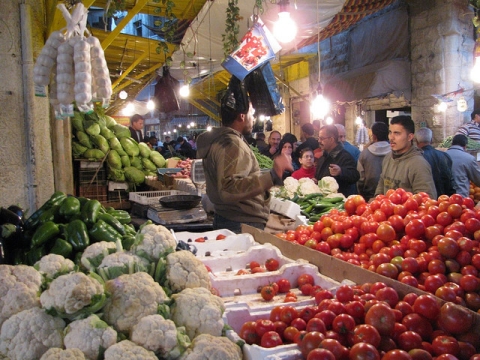
Farmers in Jordan will get reports on their cell phones about price fluctuations and market demand so they can better sell their goods. (Photo by Luigi Guarino)
Tomato farmers all over Jordan face a daily challenge. Should they collect their daily crops and send them to the central vegetable markets without knowing the market availability or price? If there is a big stock of tomatoes in that market, high supply and stable demand reduce the prices. Sometimes there aren't enough buyers and the produce goes to waste. Since there are no tomato processing facilities in Jordan, the result is a direct loss to Jordanian farmers.
The solution may lie with an application called "Box’t Bandora," which will help Jordanian farmers find out the prices and market demand for tomatoes, eggplants and other vegetables. I was one of several media developers leading a two-day brainstorming session hosted by 7iber Labs and Internews during which this app idea was generated. It's due to launch this summer.
The key to this and other innovations is bringing technologists and journalists together. I've formed a new group of Hacks/Hackers in Amman as part of my Knight International Journalism Fellowship, which is focused on merging journalism with technology to improve the delivery of news and information across the Middle East. The group is working together with the Jordan Open Source Association to develop an Android-based app that connects citizens directly to the online news site AmmanNet. It will enable journalists at the news site to collect, verify and publish citizen-journalists' reports – and build its first network of citizen journalists across the country. They intend to publish reports to a dedicated page on AmmanNet, much like CNN’s iReport. This is one of the first apps of its kind that directly connects to citizens to news media in Jordan.
Cell phones are a primary means of communication these days. There are 5.5 billion sim cards around the world, and 80% of the world's population has mobile phone access. Never before has an innovation had such global reach. With more than two billion people online, mobile and Internet are becoming communication platforms. They not only make information access much easier and versatile, but they’ve also made it even easier for each of us to create our own content and share it with the world almost in real time – through photos, videos, blogs and tweets.
Many leading media institutions are considering incorporating citizen journalism content into mainstream media, and it has become most important for media technology groups such as Hacks/Hackers to help develop tech innovations in media for news collecting and dissemination. Due to the Arab Spring, a new feeling has been born among Middle Easterners, a feeling that most of the dictator governments wanted and hated at the same time. It is “citizenship,” the feeling of belonging to and identifying with your own country.
Although all the countries suffer poverty, political and financial chaos, people have started to feel that they belong to their own countries, and the welfare of their countries belongs to them and only them. Specifically in Arab Spring countries, people are more active now, more willing to make their country a better place to live.
Citizenship, and new content creation and dissemination are the two pillars of social reform. Now, more and more citizens use social media platforms as news gathering and consumption platforms, replacing mainstream media, which don’t reflect people’s interests. Even now, as mainstream media use these platforms to follow up, there is more Internet activism through crowdsourcing, news stitching and video streaming. Not only that, but traditional media are also disseminating news in more than one context to appeal to each user taste.
It is the collective momentum of messages shared over social and mobile networks that has empowered citizens around the world to make their voices heard. That’s the power of each and every one of us.